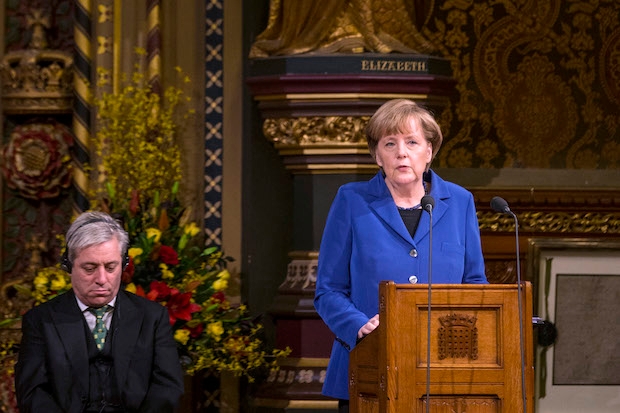David Cameron pulled out all the ceremonial stops for Chancellor Angela Merkel’s visit to London and the way in which she played along is testament to her desire for the UK to remain within the EU. The lengthy passage of her speech dedicated to British sacrifices during both world wars was a polished diplomatic gesture that played well with Britain’s ideas about itself and its own historical role in Europe. It was a gesture that she did not have to make.
However, as she said herself, Merkel’s address could never live up to the hype. This speech was never going to give us all of the answers to the EU’s future, or the viability of David Cameron’s reform and referendum strategy. With over a year to go until the UK general election, three from a possible EU referendum and few specifics to respond to, this should not have been a surprise.
The speech’s rhetoric reflected Germany’s deep historical and cultural attachment to the European project. However, Merkel was very clear about the need for the EU to change in order to compete in the 21st Century global economy. ‘We must renew Europe in keeping with the times’ was the overriding message. She called for a cut to EU red tape and warned that, with 90 per cent of global growth over next five years taking place outside the EU, Europe needs to up its game.
In another potentially encouraging sign for the Prime Minister, Merkel was clear that in order to strengthen the eurozone the EU treaties will have to be adapted in a ‘limited, targeted and swift’ manner. Cameron knows this is his best opportunity to secure treaty changes of his own, but Merkel’s desire to alter the treaties is not one shared by all other EU leaders and whether it can be secured before Cameron’s self-imposed 2017 deadline therefore remains unknown. It should also be noted that many reforms can be achieved without treaty change – for example the Dutch proposal for ‘red’ and ‘green’ cards to allow national parliaments to block or repeal EU laws.
An Open Europe/YouGov poll in the run up to Merkel’s visit found that a majority in both Britain and Germany want decisions over issues such as EU migrants’ access to benefits – highlighted by Merkel today – employment laws, regional development subsidies, and police and criminal justice laws to be taken at the national rather than the EU level. Merkel did say that subsidiarity – the principle that decisions should be taken as close to citizens as possible – ‘must be respected more in Europe’, but Cameron might have hoped for more about how to reconnect the EU with national electorates.
But the German Chancellor was never going to set out a specific, detailed offer to Britain yesterday. What Merkel’s visit underlined is that she is prepared to hear the UK’s case for reform and thinks that German and European interests are best served by the UK remaining in the EU. There’s still all to play for but the onus is now on David Cameron to articulate a clear plan of action to take to the EU negotiating table.
Stephen Booth is Research Director of Open Europe






Comments